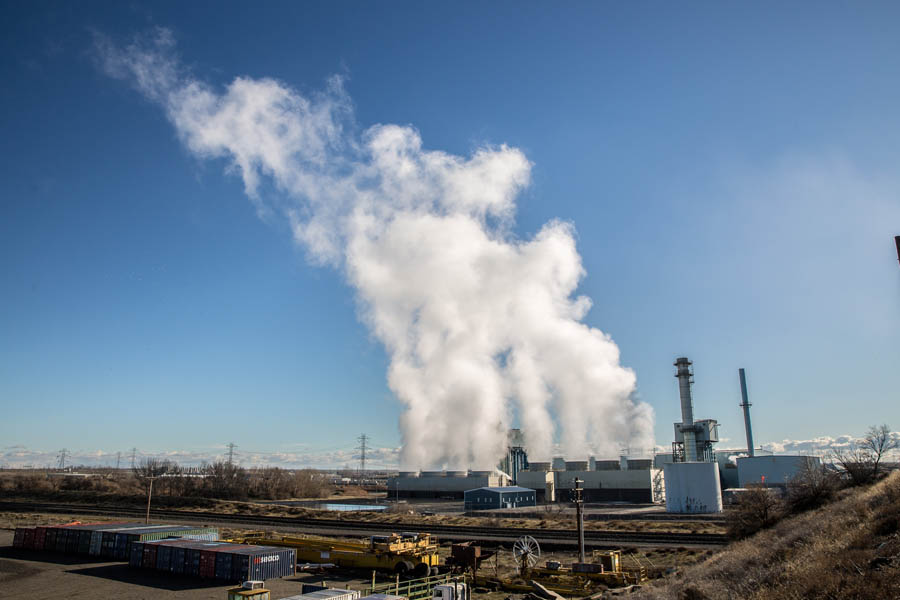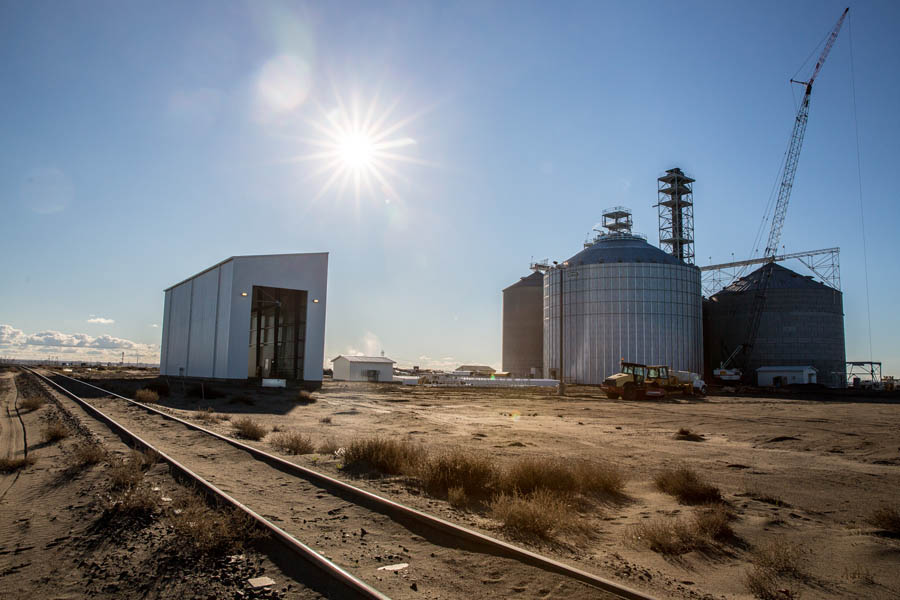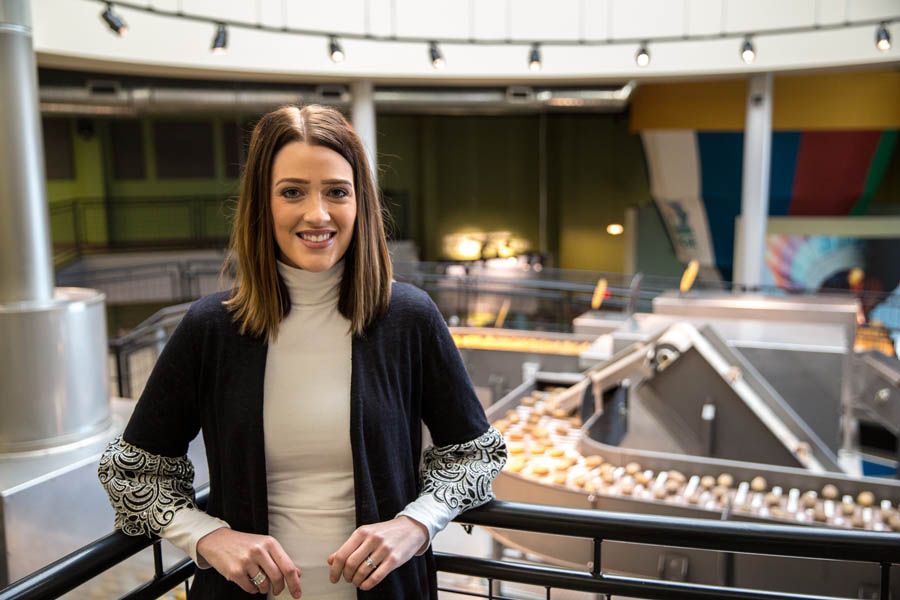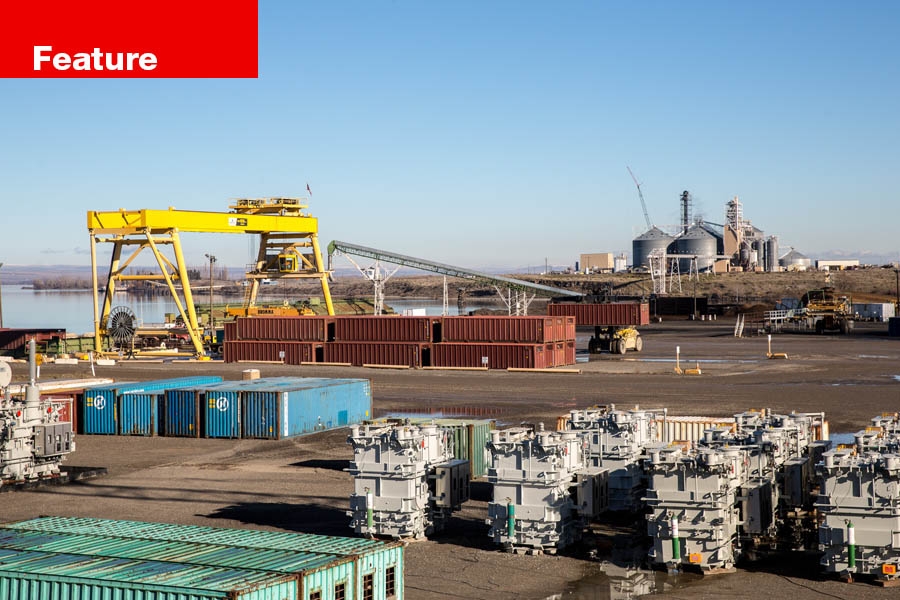The new manager of the Port of Morrow builds on a legacy of job training and diversification at Oregon’s second-largest port.
Thick white steam clouds rise up throughout the Port of Morrow’s 8,000 acres, which hug the southern bank of the Columbia River in Boardman, Oregon.
Enormous rounds of hay, produced by Oregon Hay, sit along a pasture, awaiting loading into the 50 shipping containers that are exported each week to Japan. Tillamook Creamery produces 140 million pounds of cheese each year at its on-site factory. Trains rumble down the rail line to grain terminals, picking up shipments that will be barged upriver. Lamb Weston, a food processor and one of the largest employers in Eastern Oregon, processes millions of pounds of onions, potatoes, green beans and other produce, destined for grocery stores throughout the country — and the world.
And more is on the way — three Amazon data centers are under construction. The project is worth nearly $4 billion. The port is also adding approximately 7 miles of new rail track to allow for increased connection between grain terminals and other agricultural commodities to barges along the river.
In charge of all this enterprise is Ryan Neal, the Port of Morrow’s new general manager. He took over the position late last year from his father, Gary, who was general manager for 30 years before retiring at the end of 2018.
As Neal begins his own tenure as leader of the second-largest port in Oregon, he plans to continue his father’s legacy by prioritizing infrastructure development and diversification of the port’s clientele. He also has his eye on workforce training, not only to provide a skilled, ready labor pool for the industries the port entices but also to provide high-paying jobs to Morrow County residents.
 Ryan Neal, Port of Morrow general manager Photo credit : Jason E. Kaplan
Ryan Neal, Port of Morrow general manager Photo credit : Jason E. Kaplan
In Eastern Oregon, the port is an economic powerhouse.
A December 2017 economic impact analysis conducted by the FCS Group found the port provides 8,452 permanent jobs, accounting for 52% of employment in Morrow County, a figure that increased from 36% in 2006. Its gross domestic product tops $1.08 billion.
The study found the Port of Morrow is the main point for freight distribution and export of agricultural commodities grown in the Pacific Northwest and other western states. The analysis also found the port “is likely the largest single owner of vacant industrial land” in Oregon, with nearly 800 acres that Neal says are shovel ready.
Its tenants are diverse: from agriculture to food processing to high tech and data centers and green technology.
Much of the port’s growth is due to the entrepreneurial vision of Neal’s father. When Gary Neal became general manager in 1989, there was little activity apart from some grain terminals, barge-related business and food-processing facilities.
When he saw the amount of vacant land, Gary saw potential for luring new businesses. The port has direct access to the Columbia River. The main line of the Union Pacific rail line runs through the port, and Interstate 84 runs along its southern boundary.
 Thick white steam clouds rise up throughout the port’s 8,000 acres. Photo credit: Jason E. Kaplan
Thick white steam clouds rise up throughout the port’s 8,000 acres. Photo credit: Jason E. Kaplan
That makes it an ideal location for exporting and receiving goods. Gary was determined to create as business-friendly an environment as possible and to attract new clientele. There are a “million reasons to say no” when it comes to siting new business, Gary says. “You’ve got to figure out how to make it work.”
Gary found the answer in basic infrastructure. Over the years, nearly 14 miles of rail line have been installed, which snake through the port and connect to the main Union Pacific line. Gary also oversaw the construction of roads and installation of water and sewer pipes that connect potential vacant sites to wastewater facilities and other infrastructure.
“We’ve been diligent about trying to identify ways to make those investments so that if that client should want to pull the trigger, they can,” says Gary, who sat down to chat about his decades-long tenure in December, shortly before retiring.
 Gary Neal, former Port of Morrow general manager and father to Ryan Photo credit: Jason E. Kaplan
Gary Neal, former Port of Morrow general manager and father to Ryan Photo credit: Jason E. Kaplan
Ryan Neal says the investment in infrastructure makes for a strong case when he speaks to potential clients. “You can literally take clients out and show them the piece of property, and it’s ready,” he says.
As a result, business has flocked to the port, and its portfolio of clients has diversified. During the Great Recession, the port experienced 88% growth, an indication of how diversification has helped insulate it from downturns.
In addition to its core clientele in the agricultural and food-processing sectors, data centers, clean-energy production and other high-tech manufacturing companies have located there, due to the proximity to the water resources available from the Columbia River and the availability of lots of vacant land to build large plants. Additions to the port’s clientele include data centers owned by Google and Amazon, biofuel companies Pacific Ethanol and ZeaChem, and Klean Industries, which converts plastics and rubber tires into energy. “Being a natural resource-based economy, the diversity has been a welcome addition,” Gary says.
Ryan Neal has worked in the industrial sector his entire life, focusing on transportation and infrastructure. When Neal was growing up in Boardman, he would accompany his father to work, where he’s attended meetings since he was 7, met Oregon Sen. Bob Packwood on one occasion and often drove through the port with his father.
“It’s pretty incredible to see what’s been accomplished here,” Neal says. An unassuming person, he speaks with a hint of pride and awe in his voice.
In 2015 a position for director of warehousing operations became available. “When I had the opportunity to come back and work for the port, it was absolutely a no-brainer for me,” he says.
On a recent tour, Neal points to land that was used for farming when his family first moved to the area. It now holds enormous open-air ponds where wastewater from Lamb Weston and other food processors ends up. The ponds can hold up to 700 million gallons of wastewater, which is eventually piped to nearby farms and used for irrigation. As we drive up to one pond, the air becomes thick with the smell of ripe vegetation, including a hint of roasted onion.
“That’s the smell of money,” Neal says, laughing.
“Being able to provide wastewater services to big food processors is a huge key” to making the Port of Morrow an attractive place to do business, he says.
Many of the port’s buildings are similar looking: low-slung concrete edifices that stretch out amid asphalt lots and short grass. Neal, driving down the roads stretching from one end of the port to the other, never gets lost amongst the monotony and offers details about the number of jobs or production numbers of each business as he drives by.
A quiet, matter-of-fact person, Neal is tight-lipped about deals he is currently negotiating with potential clients. He does say he is on the cusp of acquiring the Umatilla Army Depot, a former army munitions facility in Hermiston. The deal has been years in the making and will add 1,800 acres to the port’s holdings, allowing for further diversification and development.
And he shares his father’s business-friendly attitude. “I don’t know that we discriminate against any business,” he says. “It has to be ethical. We are constantly working with new clients.”
Now that Neal is general manager — after a hiring process that his father completely removed himself from — one way he hopes to build upon his father’s success is through workforce training and development, which he views as cyclically related to the increase in business: The more industries located at the port, the more jobs are available. Likewise, the diversity in industry creates diversity of jobs.
 A rail line snakes through the port, connecting agricultural commodities to barges along the Columbia River
A rail line snakes through the port, connecting agricultural commodities to barges along the Columbia River
To help create jobs, the port created a job of its own: a workforce training program manager.
Kalie Davis has held the position since its creation in 2017 and thinks of herself as a liaison between the port, the various industries that work there and the wider Morrow County community.
She regularly meets human resources and executive personnel representing various tenants to learn about their workforce needs and the job skills prospective applicants need to be hired. She also organizes job fairs and recruitment events. The port created a website advertising all the jobs available.
Much of the workforce training efforts are geared toward the younger residents of Morrow County — high school students, recent graduates and those attending Blue Mountain Community College — to help them realize they do not need to leave the area to get a good, high-paying job.
“A lot of these students want to stay” in Morrow County, Davis says. “The fact that they can have an excellent-paying job, get training locally and have a great career is something that is important to relay to them.”
There is nearly constant demand, Davis and others say, for hiring in the data center, high technology and food-processing industries.
 Kalie Davis, workforce training program manager, Port of Morrow Photo credit: Jason E. Kaplan
Kalie Davis, workforce training program manager, Port of Morrow Photo credit: Jason E. Kaplan
Entry-level positions, including jobs in maintenance and processing, pay between $28 and $32 an hour, well above the living wage in Morrow County. Higher-skilled jobs, such as electricians working in data centers, or other positions requiring skills related to robotics and automation, start at $30 an hour.
The port’s workforce-training efforts also extend to the high school level. Teachers are regularly invited to do an “externship” during the summer months, which provides opportunities for teachers, particularly in the math and science fields, to visit various companies and learn how their subject fields directly apply to jobs at the port.
“There’s a big gap in what’s needed in business and understanding business,” Neal says. “They’re able to go back and take real-world applications into the classroom.”
Davis also works to address barriers that stop people from keeping their jobs. A survey showed that housing, transportation and child care topped the list. In response, the Boardman Community Development Association created a homebuyer incentive program, funded through an enterprise zone agreement, which provides $5,000 toward a down payment. In addition, Tillamook Creamery offers $7,500 to their employees if they buy or build a home in Morrow County.
The port built the Neal Early Learning Center — named for Gary Neal and his wife, Kathy, and located near the workforce training center — which provides early learning to 80 children between the ages of 3 and 5.
In the coming years, Neal says the port will continue to focus on infrastructure development. “All clients need water, sewer and wastewater services,” he says, which will help provide opportunities for growth and expansion.
And the cyclic relationship between increased business and available jobs, which makes workforce training critical, will continue. “You’re trying to provide good, family wage-paying jobs,” he says.
Most of all, he will remember his father’s personality. “He was always trying to be fair and find solutions for the client and the port. That’s extremely important to carry on.”
To subscribe to Oregon Business, click here.





